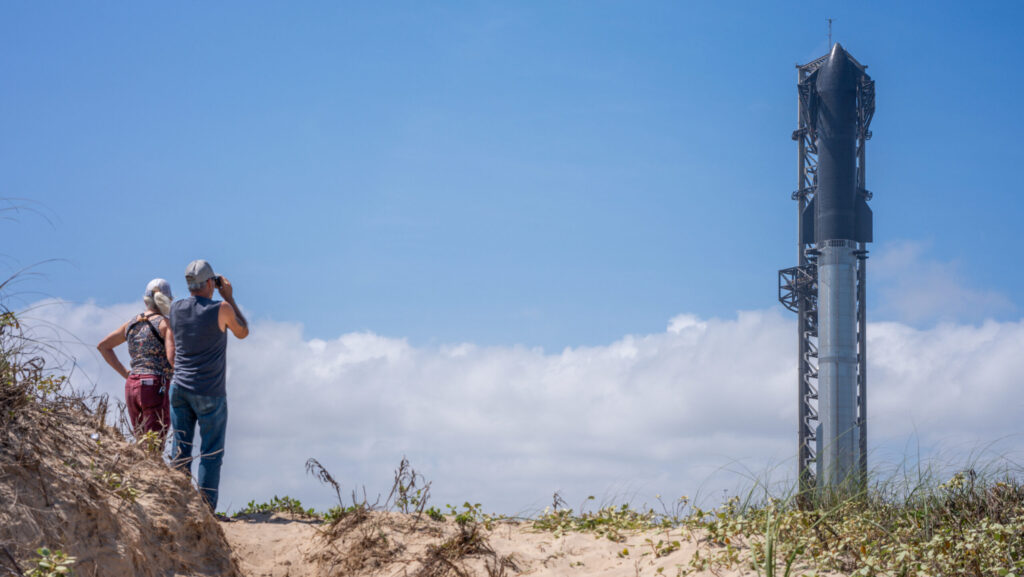
WASHINGTON — The Pentagon is ramping up pursuit of a commercial capability to deliver cargo to the battlefield via space, looking for alternative sources even as it aims for a live delivery test in the next few years aboard SpaceX’s Starship heavy lift vehicle.
The Defense Department’s near-term interest is in point-to-point delivery (P2PD) of supplies through suborbital space anywhere on the globe within 90 mins or less, with US Transportation Command particularly hopeful for the capability to rapidly drop kit into the Asia-Pacific theater in a conflict with China. For the longer term, DoD also is exploring the potential for cargo, and perhaps even people, to be rapidly transported not just to and from terrestrial locations, but also to and from orbit and the surface of the Moon.
However, the Pentagon’s goal is to be able to rely on the commercial market for such services, rather than have to carry the burden of supporting the industry.
“While this capability provides a transformation in cargo transport, many challenges remain in making cargo transport via rocket a reality. A specific focus is how the Government can take advance of commercial capabilities without taking sole ownership or creating a unique aspect that is Government only, thereby driving up life cycle cost,” the Air Force Research Laboratory explained in a May 15 solicitation for a new project seeking new concepts, and new potential providers, for P2PD.
Further, AFRL notes, DoD is interested in “the ability to influence designs early on” in order for new commercial products to be able to fill military requirements as well as those of commercial customers.
The project is called ROC STAR, for ROcket Cargo System Technologies And Research, and interested companies have until June 12 to apply for a direct-to-Phase II Small Business Innovation Research (SBIR) grant.
“While the goal is to enable up to 100 tons of cargo to be delivered anywhere on the planet within tactical timelines, there may be optimization techniques and process with smaller amounts of cargo and transportation modes other than rockets that can provide rapid delivery of materials,” the lab’s Small Business Innovation Research (SBIR) solicitation explains.
“The focus of ROC Star is on emerging commercial capabilities to minimize cost and enable agile logistics through the entire span of responsive mission planning, rapid cargo logistics, ground launch operations and coordination with commercial airspace,” it adds.
The solicitation stresses that another objective is “to grow AFRL’s Rocket Cargo industrial base.”
AFRL in June 2021 initiated Rocket Cargo as one of its high-priority Vanguard research programs, partnering with the Space Force and US Transportation Command — and in January 2022 awarded a $102 million contract to SpaceX to explore use of the company’s gigantic Starship to blast cargo through space.
TRANSCOM also has signed no-cost Cooperative Research And Development Agreements (CRADAs) with SpaceX, BlueOrigin, Sierra Space, and Rocket Lab.
SpaceX is preparing for a fourth test flight of Starship, with a launch as soon as June 5. However, the company still needs approval from the Federal Aviation Administration to fly from its Boca Chica, Texas facility. Starship’s first three tests, the last of which was held on March 14, all resulted in failure, although at the same time made progress toward reaching orbit and then safely deorbiting both the rocket and the space vehicle.
AFRL’s fiscal 2025 budget plans show that the lab hopes to complete testing of the capability to air-drop cargo pallets down from Starship during FY25, and to launch a demonstration flight to “transport 30 to 100 tons of cargo to an austere site” in late FY25 or early FY26.
Meanwhile, the Department of the Air Force is working on transitioning AFRL’s experimental activities under Rocket Cargo to the Space Force. The Air Force created a new P2PD budget line for that effort in FY25 budget request and asked for $4 million in research funding
DIU Taps First Carrier For Cargo ‘To, Through and From’ Space

The Pentagon’s reorganized Defense Innovation Unit also has been looking to encourage commercial providers “to enable responsive and precise point-to-point delivery to orbit, between vehicles in orbit, and to precisely to Earth via novel reentry vehicles and methods,” according to its website.
On May 28, DIU announced that it had recently issued the first of multiple planned awards under its project called Novel Responsive Space Delivery (NRSD, first initiated in June 2023, to The Spaceport Company to develop a new mobile sea-based launch capability. “A sea-based launch platform is a strategically significant capability that increases equatorial launch access while enabling responsive launch coordination by avoiding high-traffic airspace,” the announcement said.
Austin Baker, deputy portfolio director for DIU’s space portfolio, explained in the announcement that NRSD is aimed at supporting Joint Force needs.
“By prototyping commercial solutions for the delivery of cargo and other supplies to, through, and from space, we will equip the Joint Force with new methods for sustainment that directly address this need and provide a unique competitive advantage, particularly in instances in which conventional logistics pathways on Earth and in space are contested,” he said.